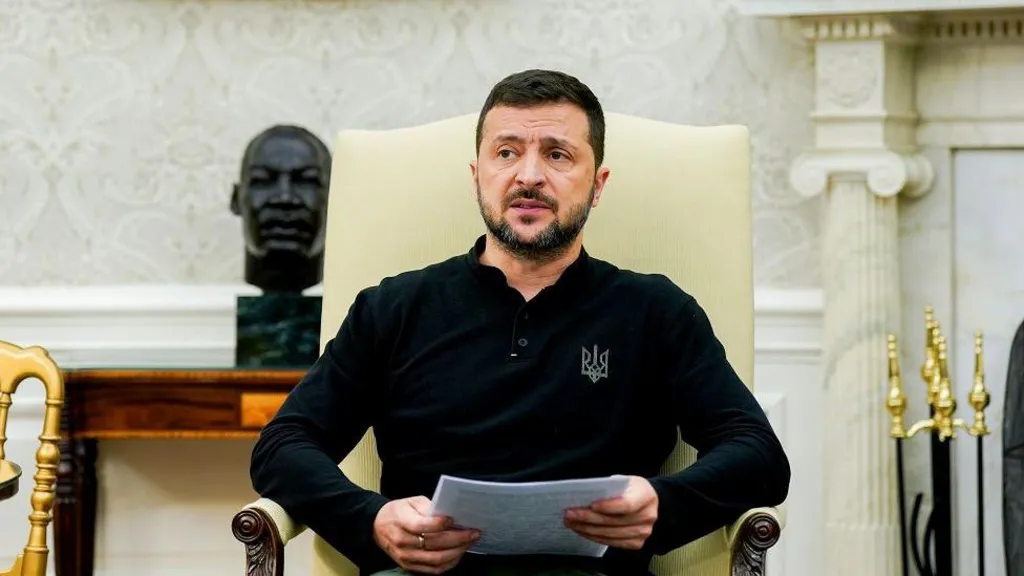Zelensky’s “Victory Plan”: A Challenging Pitch in Washington
3 min read
Zelensky during a meeting with Biden in the Oval Office.

Zelensky during a meeting with Biden in the Oval Office.
This past week was positioned as pivotal for Ukraine as President Volodymyr Zelensky aimed to promote his ambitious “victory plan” to American lawmakers during his visit to the U.S. However, it remains uncertain whether Ukraine is any closer to achieving its primary objectives.
Zelensky’s comments about former President Donald Trump and his running mate, JD Vance, have stirred controversy among senior Republicans. In an interview with The New Yorker, he suggested that Trump “doesn’t really know how to stop the war” and described Vance as “too radical.” Ukrainian political analyst Mariya Zolkina, a research fellow at the London School of Economics (LSE), labeled these remarks a “big mistake.”
Furthermore, Zelensky’s visit to an ammunition factory in Pennsylvania, where he met with top Democrats, faced backlash from Republican lawmakers who accused him of meddling in the upcoming elections. This unexpected criticism caught Zelensky’s team off guard, as they are typically known for their strategic public relations.
Zelensky’s visit was strategically timed to secure essential support from President Joe Biden, who has limited time left in office. However, it also meant navigating the tumultuous landscape of the U.S. election campaign—a precarious balancing act.
Despite initial reports that Trump intended to distance himself from Zelensky, the two eventually met at Trump Tower. The encounter was marked by awkwardness, particularly when Trump asserted he maintained a “very good relationship” with both Zelensky and Russian President Vladimir Putin, a statement that resonates painfully with Ukrainian officials. Zelensky attempted to clarify that he hoped for better relations with Trump than with Putin, but Trump brushed it off with laughter.
While Zelensky later described the discussions as “very productive,” there has been little indication that he successfully shifted Trump’s stance. At a rally in Michigan, Trump reiterated his desire to quickly “settle” the war, a stance many interpret as a potential pivot towards cutting aid to Ukraine and pressuring the country into territorial concessions.
On the Democratic side, Vice President Kamala Harris implicitly criticized Trump during the same week, arguing that those advocating for land concessions in exchange for peace were endorsing “proposals for surrender.” This statement underscored the contrasting perspectives between the two parties regarding Ukraine’s sovereignty.
Zelensky’s whirlwind diplomatic engagements included a meeting with Biden at the White House, where he presented his “victory plan.” Although Biden and Zelensky’s discussions were described as cordial, the outcomes remained ambiguous. Key elements of Zelensky’s proposal, which have not been disclosed, likely include a request for Western-made long-range missiles to target military sites deep within Russia. Despite Ukraine’s persistent requests for this capability, no green light has been given.
Additionally, Zelensky seeks robust security guarantees and an eventual invitation to join NATO. While NATO has expressed optimism regarding Ukraine’s future membership, it has been clear that accession will not occur while the country is actively engaged in conflict.
Meanwhile, Russian forces continue their offensive in eastern Ukraine, despite Kyiv’s surprise incursion into Russia’s Kursk region. Zelensky’s aim with the “victory plan” is to strengthen Ukraine’s battlefield position and push for a diplomatic resolution with Russia. However, according to Zolkina, the proposals have not generated significant enthusiasm in Washington.
Zolkina emphasizes that Ukraine’s expectations for NATO membership are not aligned with U.S. sentiment at this time. Critics of Biden suggest he has been hesitant to authorize long-range missile use, potentially influenced by political considerations regarding the upcoming election.
In Kyiv, public sentiment remains steadfast against territorial concessions to Russia. Many believe that any truce would simply allow Putin to regroup for further attacks. However, Zolkina notes that if credible security guarantees were presented, discussions around a ceasefire might evolve, reducing political resistance to negotiations.
As Zelensky sought to promote his “victory plan,” the reality is that Washington has yet to demonstrate significant eagerness to embrace it. Moreover, shifting global events, particularly in the Middle East, have diverted attention from Russia’s ongoing aggression in Ukraine, complicating Zelensky’s mission further.